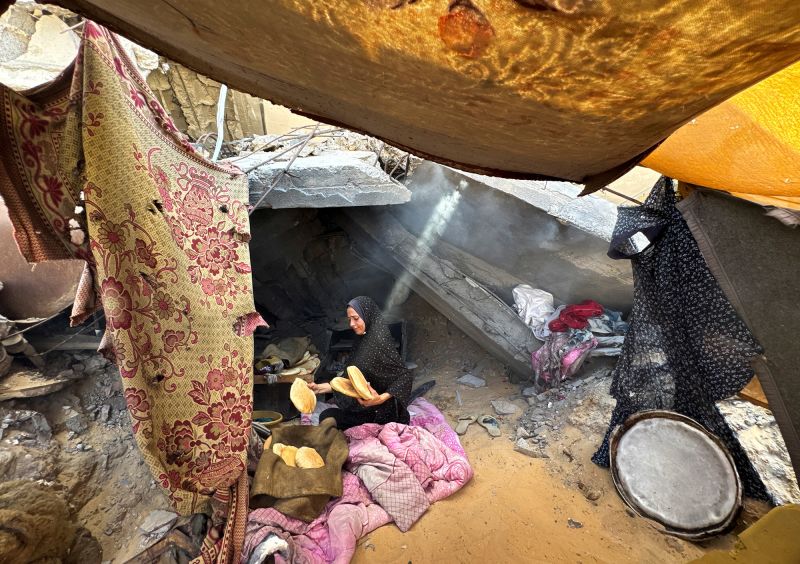"We don’t have the luxury of grief": Humanitarian worker in Gaza reflects on a year of war

A Palestinian woman holds pita bread in a makeshift tent next to rubble of a house destroyed, in Khan Younis, southern Gaza, on Monday
One humanitarian worker in Gaza said they “don’t have the luxury of grief” as she reflects on the one-year anniversary of the October 7 attacks that sparked the Israel-Hamas war.
Lena, a worker for the non-profit organization Mercy Corps, said she has been displaced more than a dozen times since last year. She is currently living in a shelter in central Gaza. CNN is not using her real name due to concerns for her safety.
“We don’t have the luxury to cry over the ruins of our destroyed homes. I haven’t been able to see my home since October 8, and I wasn’t able to retrieve a single memory from its rubble and shattered remains,” Lena said.
“We haven’t put our clothes in wardrobes, bathed comfortably, had a meal with any sense of peace, slept on a proper bed, or had clean drinking water in over a year,” she added.
Lena described the humanitarian situation in the enclave as “unbelievable.” She said that as a humanitarian worker, she has “seen firsthand the overwhelming needs in terms of shelter, food, and basic supplies.”
“Every day brings new challenges, but we do our best to support vulnerable populations through emergency response programs, even when resources are stretched thin,” she said.
The Israel-Hamas war has been the deadliest year for journalists
The year since the Israel-Hamas war began in Gaza has been the deadliest for media workers since most journalism and press freedom organizations have started tracking journalist deaths in conflict.
According to the Committee to Protect Journalists and Reporters Without Borders, at least 128 journalists have been killed since the beginning of the war, nearly all of them Palestinian media workers in Gaza killed as a result of Israeli airstrikes. Some of the journalists died while wearing protective gear identifying them as members of the press. Multiple news organizations and free press groups have accused the Israeli military of deliberately targeting journalists.
The Israeli military has repeatedly said it does not intentionally target journalists, but that it cannot guarantee the safety of reporters in an “active military zone” and has accused Hamas of deliberately placing military operations “in the vicinity of journalists and civilians.” It has also accused a handful of Palestinian journalists as having participated in the October 7 attack or being members of Hamas, something the media organizations have largely and vehemently denied.
Many media organizations, including CNN, evacuated their full-time staff in the enclave with their families as soon as possible. Gaza was never an easy place to report from, between restrictions on entry and exit and pressure from Hamas against any inkling of dissent.
Reporters in Israel have also noted a marked increase in physical attacks, with the Union of Journalists in Israel noting at least 40 such attacks since October 7, from security forces as well as civilians. Four Israeli journalists were killed in the October 7 attacks, and others barely survived.




















